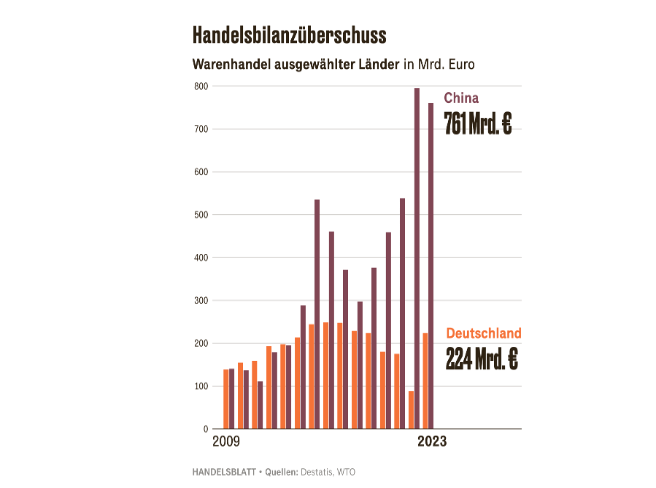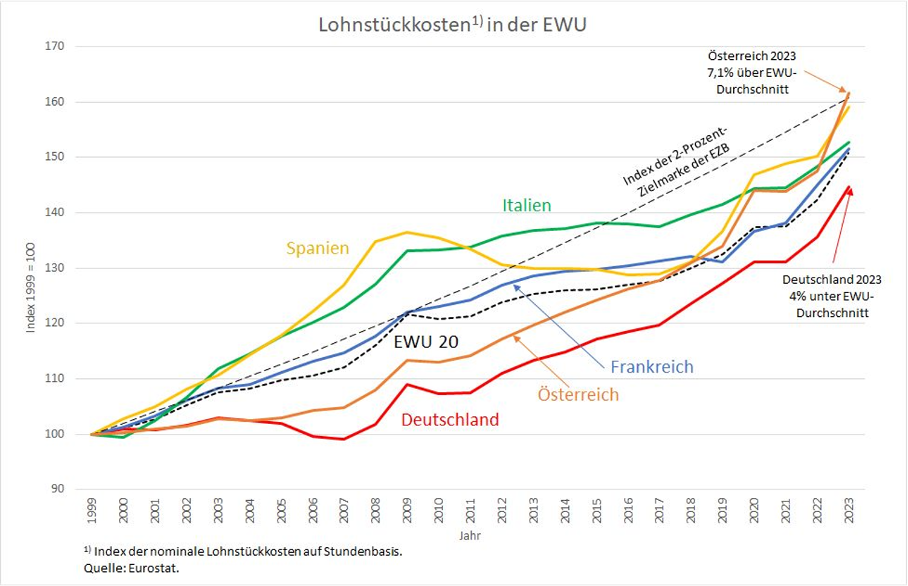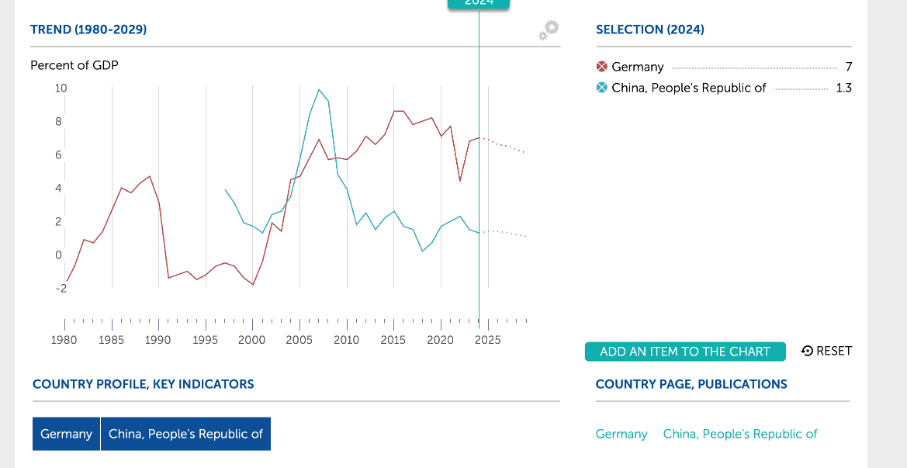‘Germany in the focus’ was the headline of a story on ntv a few weeks ago about Peter Navarro, known as ‘Trump’s trade warrior’. Navarro is currently in prison for four months, but if he wins, Trump will probably quickly bring him back into the administration with responsibility for international trade. Navarro’s description by the broadcaster is causing nerves to flutter in Germany:
“The economist represents a radically mercantilist position. For him, trade is competition, foreign trade surpluses are synonymous with national prosperity. For him, the US trade deficit is an expression of weakness. That corresponds to Trump’s world view.”
That is truly shocking. Equating foreign trade surpluses with prosperity cannot be surpassed in terms of perfidy. Every good German economists knows very well that only a balanced trade and current account balance allows a country to realise the prosperity gains promised by the theory of international trade. And international trade can never be competitive, because we know that there is an international monetary system that systematically prevents individual countries from gaining absolute advantages by trying to improve their national competitiveness.
If Germany were to try – against all reason – to increase its competitiveness, the euro would immediately appreciate and the advantage would be cancelled out. Within a monetary union, as we all know by heart, any attempt to increase national competitiveness is pointless from the outset, because we would only damage our partners, whose weakness would immediately fall back on Germany.
China is also a mercantilist
The Chinese also have increasingly strange ideas. If you believe Deutschlandfunk (in the stock market interview of 12 July 2024 and the expert interviewed there (bank economist Ulrich Kater), the Chinese economy is becoming increasingly unbalanced because they are relying entirely on exports and domestic demand is stagnating. According to Kater, Chinese wages are stagnating and preventing sufficient imports. China, we hear everywhere, produces more than the country itself can consume and throws its surplus goods onto the world market by force. The European Commission has already reacted to this outrageous disregard for the principles of the free exchange of goods by introducing ‘punitive tariffs’ for Chinese e-cars.
Handelsblatt has also produceda graphic (Figure 1) that clearly shows the extent to which the Chinese are abusing the freedom of international trade. Calculated in billions of euros, China’s trade surplus in goods in 2023 was over 750 billion euros and the German surplus was a mere 224 billion euros. How this is to be assessed in view of the fact that China’s GDP is at least four times as large as that of the Federal Republic of Germany, I will leave open for the time being.
Figure 1
At least the Handelsblatt has realised that Germany is sitting in a glass house when it throws stones at the Chinese. Beijing is defending itself with German strategy, it says. Beijing counters criticism of its export policy with a statement that is not unknown in Germany: ‘Companies from the People’s Republic are simply better.’
In fact, Western companies have been making huge profits from production in China for decades with ultra-modern Western technology combined with low Chinese wages and have conquered the world markets from there. Now that the Chinese are implementing this model themselves, politicians are fainting by the dozen: this is not what was meant by free trade! If our companies win, that’s fine, but the fact that foreign companies also want to win is not acceptable.
Who is subsidising?
However, the Handelsblatt, clever as it is, immediately discovered the flaw in the Chinese argument. China subsidises its exports and that is what makes it so successful. Chinese industrial policy is even based on a well-thought-out plan and Germany cannot really be accused of having such a plan or strategy. Correct again! However, the ability to think strategically is not what matters with mercantilism.
Germany’s political pressure on wages at the beginning of the European Monetary Union was certainly not the result of a plan, Schröder and his cohorts should not be accused of having that much understanding of economics, but it worked because the other members of EMU were taken by surprise. The result has been a completely unjustified absolute advantage for Germany for more than two decades. The vehement media and political defence of this is crystal clear proof of German mercantilism. Even today, Germany still produces absolutely cheaper than most other members of the European Monetary Union if you compare the development of unit labour costs from the start of EMU to today (Figure 2).
Figure 2
Navarro ante portas
If Trump comes back to power, and who would have any doubt about that today, he will bring back Peter Navarro and he will accuse Germany, as he did four years ago, quite rightly of sheer mercantilism. We should think carefully today about whether to counter it again with the rubbish arguments from last time along the lines of ‘we can’t ban our companies from exporting’ (as well presented in the Handelsblatt ), or whether to show understanding and thus prevent justified protectionism from the American side.
The only chance Germany has is that, even under Trump, the Americans consider the economic attack on the Chinese so important that they consciously go easy on their Western trading partners. If Europe goes along with this, however, it will be completely dependent on the USA and will have played the rest of the world off. If China is clever, it will show the rest of the world the IMF’s graph below (Figure 3), which demonstrates better than any argument how dishonest a major Western power can act once it has abandoned logic and completely subjugated itself to a ‘colonialist ideology’.
Figure 3
The German current account surplus of probably 7 per cent of GDP in the current year is an unparalleled scandal. However, it becomes a real political catastrophe when Germany accuses countries that have fairly balanced balances, such as China, or even high current account deficits, such as the USA, of mercantilism when they defend themselves against the actual mercantilists.







